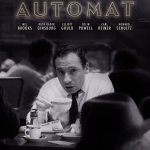In an isolated mountain village in 19th century Macedonia, a young girl is kidnapped and then transformed into a witch by an ancient spirit.
Chuck says:
Focus Features is promoting “You Won’t Be Alone” as an elevated horror film that promises thought-provoking chills like those found in David Egger’s “The Witch” or Ari Aster’s “Midsommar.” To a certain extent, this European import delivers on that promise but there’s much more at play in Goran Stolevski’s debut feature. Drawing on European folk tales, the movie is not so much a horror film but rather a mediation on life featuring horrific moments. What with its slow pacing and deliberate focus on nature and our connection to it, it would be easy to mistake this as a Terrence Mallick production. As such, it’s likely to tax the patience of those expecting standard monster fare.
Set in 19th-century Macedonia, Old Maid Maria (Anamaria Marinca) is a witch who longs to be a mother. She strikes a bargain with a local villager, forcing her to turn her daughter Nevena (Sara Klimoska) over to her when she turns 16. Thinking she can fool the crone, she raises the child in isolation, shutting her off from the world. Of course, this ploy does not work and the transaction is ultimately made. However, the relationship that develops between the two is not what Maria hoped for and she ultimately abandons Nevena. However, before doing so she passes on her ability to inhabit another being’s body.
It’s during these transitions that most of the film’s more horrific moments occurs. Entrails and organs are graphically extracted, effectively underscoring the lengths Nevena will go to in order to escape who she is as well as the depths of her curiosity. Having grown up cut off from all social interaction, she longs to find out what it’s like to be human and takes the form of multiple creatures to find out.
Her initial choice is an unfortunate one as she becomes Basilka (Noomi Rapace), a woman abused by her insensitive husband and forced to work in horrendous conditions. Realizing this is not the life for her, she becomes a dog so that she might observe human beings from a safe distance. While doing so, she spies Boris (Carlotto Cotta), a young man on the verge of his first romantic relationship and soon assumes his identity.
What’s so striking, and ultimately moving, are the movie’s small moments, the scenes in which Nevena, in her various guises, discovers what it is to be human. The quiet, awed observations from Klimoska, Rapace ant Cotta over the most trivial aspects of our existence are a wonder to behold and effectively serve as the connection that unifies the three performers in their portrayals of the film’s curious soul. As stated before, Stolevski’s pace is very deliberate and over time it becomes apparent why. His intent is to show us our world through fresh eyes, forcing the viewer to take the time to appreciate the small, mundane, marvelous things that we often overlook. It’s a daring approach that runs the risk of alienating the audience, but the viewer’s patience is rewarded once you recognize the director’s intent.
“Alone” purposely upends expectations and its to Stolevski’s credit that he sticks to his vision, caring not a whit about commercial concerns. Kudos to Focus Features as well for backing this challenging film, one that will likely generate bad word of mouth from initial viewers expecting something more obvious and less cerebral. Beautiful and haunting, “Alone” is a film that invites repeat viewings so that all of its mysteries can be unlocked. Here’s hoping an audience that appreciates such efforts and is up the challenge of discovering all it has to offer will find it.
3 1/2 Stars
Pam says:
Writer and director Goran Stolevski’s poetic horror film is both visually and intellectually captivating as we watch this young girl transform herself into others, awaiting a chance to find love and happiness. We see the world and the people through her innocent eyes even as the inadvertent gory violence occurs. This is one of the most unexpectedly touching, vibrant, and disturbing looks at the amalgam of horror, human nature, and our explicit desires.
To read Pam’s review in its entirety, go to AWFJ




